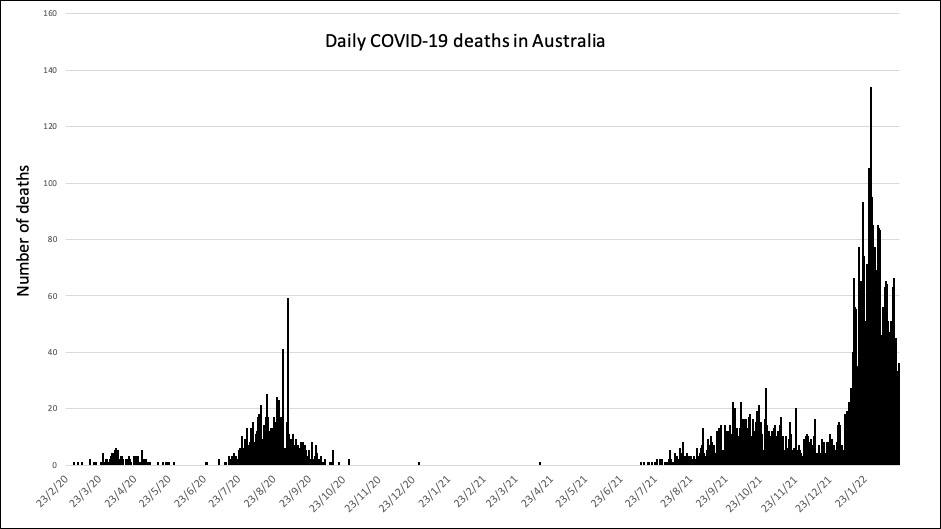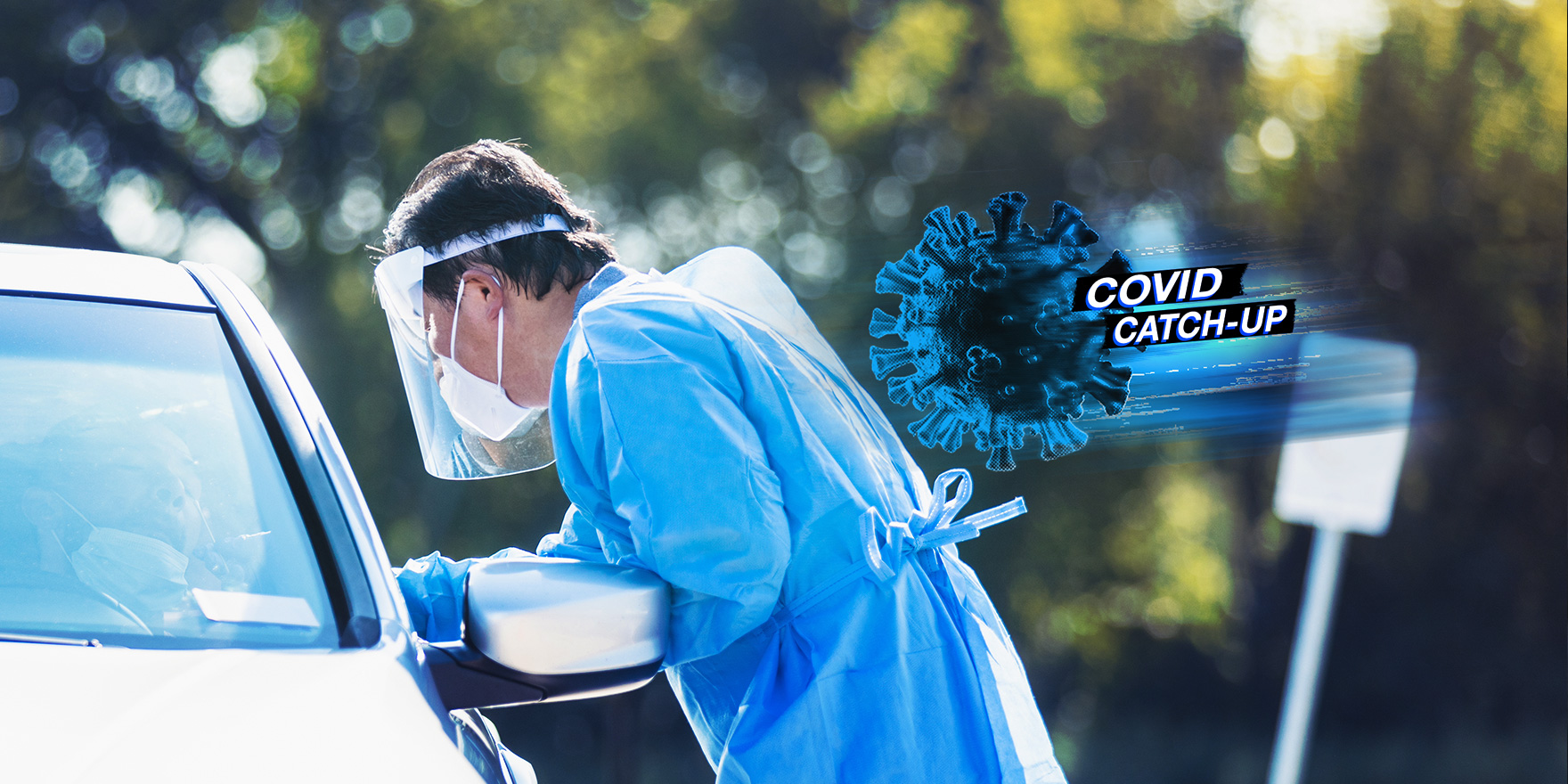And antidepressant use increased significantly in the first year of the pandemic, especially in women.
Welcome to The Medical Republic’s Covid Catch-Up.
It’s the latest covid-19 news in one convenient post. Email bianca@biancanogrady.com with tips, comments or suggestions.
24 February
- Australian government calls for aid from retired, part-time healthcare workers.
- Antidepressant use increased significantly in the first year of the pandemic.
- ATAGI recommends Spikevax for use in 6-11-year-olds.
- Genuine medical reasons from covid vaccination exemption are rare, ATAGI says.
- Risk of multisystem inflammatory syndrome after covid vaccination in children and adolescents less than one in a million.
- UK rapid antigen testing could be missing nearly 40% of infectious cases.
- England removes requirement to isolate after testing positive for covid or as close contact.
- Global covid infections continue to fall.
- Covid claimed 233 lives in Australia this week.
Amid reports of Australian healthcare workers quitting in droves due to exhaustion and burnout, the Australian government has called for retired, part-time and under-employed health care workers to “lend a hand to support the health workforce and the Australian community.”
As of the end of January, there were more than 23,000 healthcare workers registered with AHPRA’s pandemic response sub-register, including more than 16,000 nurses and around 1500 pharmacists.
However, with these registrations due to expire this year, AHPRA and the federal government are looking to maintain and replenish the ranks of practitioners available when the next SARS-CoV-2 variant inevitably hits the fan.
The AHPRA register for those who joined (or were joined, as the register is opt-out rather than opt-in for all eligible practitioners) in 2020 expires on 5 April 2022, and for those who joined the 2021 register it will expire on 21 September 2022.
AHPRA says it is now contacting practitioners on the 2020 register to ask if they want to extend their registration until 21 September – which does not involve a fee – or apply to join the main register, which does involve a registration fee.
The federal Department of Health has also set up an online form asking for expressions of interest from healthcare workers in joining a surge workforce for health and aged care. Applicants must be up to date with covid vaccinations and registered with AHPRA on the main register or pandemic sub-register.
Antidepressant use in Australia increased significantly during the first year of the pandemic, even against a backdrop of rising numbers of prescriptions.
A study of national dispensing data for antidepressants in Australia from 2015–2021, published in the Australian and New Zealand Journal of Psychiatry, revealed a 2.2% increase above predicted levels of antidepressant use for 2020 in females, but the biggest increase – nearly 12% – was seen among adolescent females.
New antidepressant use increased by 3% in women and nearly 5% in men, but among adolescents new antidepressant use shot up by 46%-57%.
Following the TGA’s approval last week of Moderna’s Spikevax for children aged 6-11, the Australian Technical Advisory Group on Immunisation has also given the nod to the vaccine in this age group.
The paediatric dose is half that of the adult dose, but the same as the booster dose of the vaccine, and ATAGI has warned vaccine providers to be wary of potential dosing errors as there is not a specific paediatric formulation of this vaccine. The recommended schedule is two doses, eight weeks apart.
There are very few situations in which a genuine medical exemption from covid vaccination is warranted, but there are some circumstances that warrant a temporary exemption, according to new guidance from ATAGI.
Individuals can be exempt from receiving an mRNA vaccine – but not other forms of covid vaccines – if they have experienced inflammatory cardiac illness within the past three months, acute rheumatic fever or acute rheumatic heart disease, or acute decompensated heart failure.
People who are undergoing major surgery or being admitted to hospital for serious acute medical conditions can be exempt from covid vaccination but for no longer than six months. Those with acute SARS-CoV-2 infection can defer vaccination only until up to four months after infection, and it must be confirmed with RT-PCR or rapid antigen testing. Vaccination can also be delayed in people being treated with covid monoclonal antibodies or convalescent plasma.
The risk of vaccinated children and adolescents developing multisystem inflammatory syndrome (MIS-C) after covid vaccination is as low as one per million vaccinated individuals compared to around 200 cases per million in unvaccinated young people who get covid.
Writing in The Lancet Child & Adolescent Health, researchers present analysis of national surveillance data which identified 21 cases of multisystem inflammatory syndrome occurring at any time after receiving a dose of covid vaccine.
Fifteen of the cases had evidence of SARS-CoV-2 infection, and of these 10 had received one dose of the Pfizer vaccine and five had received two doses.
“The surveillance has limitations, but our findings suggest that MIS-C without evidence of SARS-CoV-2 infection is rare after covid-19 vaccination,” the authors wrote.
A rapid antigen test widely used in the UK may give false negative results in two-fifths of cases where the person is infectious and at risk of transmitting the virus to others, a study has found.
A study published in the BMJ analysed data on test results, PCR cycle thresholds, viral culture results and secondary cases associated with more than 231,000 symptomatic patients and 2.4 million contacts.
This revealed that the Innova lateral flow test, which is not currently available in Australia, missed 38% of cases that tested positive on PCR, 20% of those with positive viral culture and 38% of cases who went on to be a source of transmission to a secondary case.
Among people who were asymptomatic, the rapid antigen test would miss 59%-92% of those who tested positive on PCR, 29%-81% of those with positive viral cultures, and 47%-90% of those who were a source of transmission to another person.
The highest risk of a false negative with the rapid antigen test occurred, unsurprisingly, when the viral load was just within the threshold for positivity on PCR – a cycle threshold of 18-25, with 30 being the threshold for positivity.
People who test positive to covid and close contacts in England no longer need to isolate, under new rules that come into force today.
While people who test positive are advised to stay at home “if they can” and avoid contact with others, it’s no longer legally required under the new “Living with Covid” plan.
The government is also ending its contact-tracing program, removing the requirement that business have covid-safe plans and practices, and revoking national health protection regulations created to deal with the pandemic. “Local authorities will continue to manage local outbreaks of covid-19 in high-risk settings as they do with other infectious diseases,” Public Health England said in a statement.
The move has been condemned by medical experts, with two separate BMJ editorials describing the decision to end free covid testing as “irresponsible” and the end of isolation requirements as putting the lives of vulnerable people at risk, especially while Omicron case numbers are still high.
Scotland is sticking with the requirement that positive cases isolate for seven days.
Another substantial decline in new covid infections has occurred globally, with the number of new cases dropping by 21% this week compared to the previous week.
The latest WHO figures give some cause for hope that the world is finally seeing the back of Omicron. Deaths from covid have also dropped by 8% compared to the previous week.
Globally, the BA.2 Omicron sub-variant now makes up an estimated 7.5% of all covid infections.
Covid claimed 233 lives in Australia over the past week:



